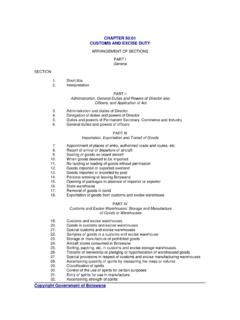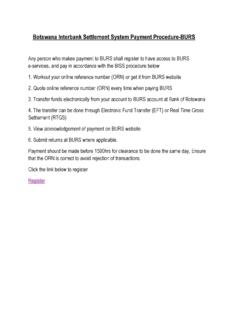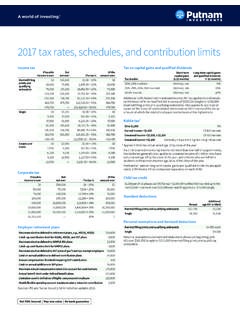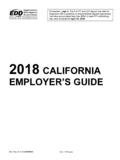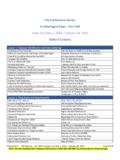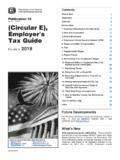Transcription of DEPARTMENTAL GUIDANCE NOTE ON TERMINAL …
1 DGN 4 Department of Taxes DEPARTMENTAL GUIDANCE NOTE ON TERMINAL GRATUTIES - EXPATRIATE EMPLOYEES 1. INTRODUCTION The purpose of this note is to set down the general practices followed in relation to exemption from tax of payments of bonus or gratuity paid to expatriate employees on termination of contracts of employment , subject to the provisions of section 132 et seq. (close companies). The law relating to taxation of gratuity received by expatriate employee has been changed by Income Tax (Amendment) Acts 1999 and 2000. DGN deals with both the contracts commencing before and those contracts commencing on or after The terms of the Note have no force in law and do not restrict any taxpayers rights under the Act, in particular, the right of objection or appeal.
2 In the case of expatriate employees whose contract Commenced on or after , the relevant provisions are in Section 31 (11) of the Income Tax Act., 1995 (Paragraph 5(b) of Taxation (Amendment Act) 1999 and and paragraph 4(c) of Income Tax (Amendment) Act 2000) 2. General In the case of expatriate employees whose employment commenced before , The relevant provisions are in paragraph (xviii) of Part II of the Second Schedule to the Act. The gratuity received by an expatriate employee under a contract of employment commencing before 1st July 1999 would be exempt under paragraph (xviii) of Part II of Second Schedule subject to fulfillment of conditions laid down by the Commissioner of Taxes.
3 In the case of gratuity received by an expatriate employee under a contract of employment commencing on or after 1st July 1999, one third of such gratuity will be exempt and balance two third will be taxable subject to the amended by Income Tax (Amendment) Act 2000. Subject to any special arrangements agreed with any individual employer, under current legislation and practice gratuities payable on termination of employment may be exempted (either fully or in part depending on whether the contract commenced before or on or after ) from income tax provided the under noted conditions are met: i) The employee must not be a Citizen of Botswana; ii) The gratuity must be due in the terms of a written contract or employment ; iii) The gratuity must be due only on termination of the contract or employment .
4 Iv) There must have been a continuos period of not less than two years employment under the contract, in Botswana, at termination; v) The employee must not have accrued any benefit under any employer s retirement benefit arrangement for or during the period of the contract; vi) The amount of gratuity to be exempted will not exceed. a) In the case of an employee s first contract with the employer 25%, and b) For a second contiguous contract 27 and c) For a third and subsequent contiguous contracts 30% of the salary paid under the appropriate contract; and vii) A directive must be obtained from this Department (form ITW 4) before payment of the TERMINAL gratuity in the case of contracts which commenced before In the case of contracts commencing on or after employer must withhold tax from payments in accordance with Section 31(11) as amended by Income Tax (Amendment) Acts 1999 and 2000 and DGN and instructions issued by the Commissioner of Taxes.
5 Further to that the employer should obtain form ITW 6A (CONFIRMATION OF TAX OWED) from our Business and Investment division. Where the amount of the gratuity exceeds the appropriate percentage of salary, but otherwise complies with the conditions for exemption, only the excess is to be taxed. Where condition (iv) above is not met, and the employer or employee claims special consideration, the case is to be referred to the Commissioner with a written submission, supported by written evidence as necessary. Some of the requirements are mandatory and some subject to Commissioners opinion as indicated in the following paragraphs.
6 3. Mandatory provisions General These provisions are seen, as requiring that a payment considered for exemption must be: (a) due from an employer to his employee; (b) due to an expatriate employee; (c) due in terms of a written contract of employment (d) due on bonafide termination of the employment ; and (e) Due as bonus or gratuity . Payer The employer must, himself, have the obligation to make the payment. A condition that the payment accrues from some other person will preclude consideration of the payment in terms of paragraph (xviii) of Part II of Second Schedule and Section 31(11) of the Income Tax Act and this will apply whether or not the employer acts as a conduit.
7 Citizenship The right of the payment must arise to a non-citizen. Where, however, the employee has become a citizen of Botswana during the course of the employment a portion will be considered for exemption. That portion considered will be related to the period served, under the relevant contract, as a non-citizen. Contract The contract under which the payment is made must be in writing signed by both parties and is expected to exist at the time the employment commences. In this connection it is known that certain employers have printed standard conditions of employment .
8 In such cases a written offer of appointment referenced to those conditions and accepted, in writing, by the employee is considered to meet this requirement. It is understood that contract conditions may be changed during the contract period. Such changes might not be acceptable where there is a retroactive effect and, especially, will this be the case where income, which accrued prior to the change, is converted to TERMINAL gratuity or bonus. Any contract which has been amended to extend the term of the contract beyond and which would otherwise have expired before would be treated as new contract commencing on or after Where a contract provides for the retention by the employer of a portion of remuneration, which has already accrued, the amount so withheld or set aside is not TERMINAL payment to be considered for exemption.
9 Termination The employment with the employer must be coming to an end in this regard a contract for a fixed period is considered to be an employment which terminates at the end of the contractual period. A renewal of a contract in terms similar to a contract already completed is read as a new employment . A contract that is extended is seen as terminating at the end of the period in which it would have terminated but for the extension and the contract period after that date is treated as new contract. For instance, if a contract which would have terminated on 30th June 1999 has been extended beyond that date, the contract is deemed to have terminated on 30th June 1999 and the service after that date would be treated as under a new contract.
10 Any gratuity relating to the period after in cases of extension of contract will be taxable under section 31(11). Bonus or gratuity These items are seen as rewards in respect of the whole period of the employment . They must also to be of a non-recurrent nature before being considered for exemption. A payment of an annual bonus falling due on termination is not seen to fall within the exemption provisions nor is a payment of compensation similarly falling due. 4. Provisions subject to Commissioners opinion General Matters following to be decided under this head are the reasonableness of the amount of the payment in relation to: (a) the period of employment ; (b) the nature of the employment ; (c) the salary payable; and (d) The measure of retirement benefits generally prevailing.
